There’s the comics you read to escape reality, the ones you use to teach, and some you read for their historical significance. Once every few years, a comic comes out that does all three. Surgeon X from Image Comics is more than just the debut of writer Sara Kenney or the book which brought back the esteemed Karen Berger to comics; it’s a book which changes the way we think about not only the science of medicine but the character of those who practice it.
The world of Surgeon X is a dystopian future where mankind’s advancements in science, sociology, and technology are ratioed to our over dependence on antibiotics. When bacteria and disease become resistant to the medicines doctors have overprescribed for decades; people in this world become mortally susceptible to simple infections curable in our time. Amongst political turmoil, one disgraced doctor will violate their Hippocratic Oath to save people who the government has given up on by using experimental surgery and black market drugs. What led to Rosa Scott becoming Surgeon X and the god-complex she’s developed along side it will have readers look at their own doctors in a more human light.
There is nothing to fairly compare this to in the world of comics. The only thing which comes anywhere close is the PlayStation video game masterpiece The Last of Us. Both take place in dystopian futures where highly plausible infection has doomed mankind. These two worlds bond on a spiritual plane. It isn’t simply story or plot which connect these two; it’s the moral compromises the characters in both have to make. We watched Joel’s fatherhood instincts in TLOU and Rosa’s doctor background in Surgeon X question the ethics of science and by extension shake the audience’s core beliefs. That’s a power few things in any form of entertainment can achieve.
After reading the first few issues of this intense series; I had the distinct pleasure of talking to Surgeon X’s creator, writer Sara Kenney. Not only is Sara a storyteller, but she brings a unique perspective as a former scientist for the Environment Agency.
COMICS BEAT: What was the inspiration for Surgeon X? Did it come from any films, novels, or simply from your time in biological sciences?
SARA KENNEY: The idea has evolved over a decade, but came from my experiences of the medical world and the experts I’ve met and spoken with over the years. I’ve been thinking about this character for such a long time – a female surgeon who has an incredible ability at surgery but isn’t a superhero. I’ve got folders and folders of story ideas for dramas and for documentaries, I was looking back through the folders and I found an idea I wrote for a Future Shock for 2000AD called The Medic. It was a story about an extraordinary female surgeon, who uses futuristic technology. I never submitted the idea – I was too chicken!
More recently I was searching through further story ideas and the idea for this character actually goes back to 2003! I was selected for a short film-writing scheme called Jerwood Shorts. I next applied to their feature film scheme and wrote a treatment called ‘Obsession’. It was about this range of characters with obsessive characteristics whose lives ended up entwined. It was a terrible treatment – but one of the characters was a female neurosurgeon who lived in the New Forest and had futuristic surgical equipment so she could conduct surgery remotely. The story was set in 2050 and in this world people had become incredibly isolated as they work from home in many professions. One character was an obsessive shopaholic whose house was filled with things she bought on-line. The surgeon character was a recluse, but an incredible surgeon.
Since then I’ve been shaping the idea for Surgeon X and 2014 was the year I really developed it a lot further. I think the events going on since the recession and with the antibiotic crises all filtered into this dystopic world that Rosa Scott inhabits.
CB: I can see how those ideas evolved into this book. You’ve been a storyteller in documentary film and animation, what brought you into comics?
SK: I read a lot of Vertigo comics as a teenager and couldn’t believe the incredible worlds and characters created by the authors – so extreme. I had no idea how to get into this world, so didn’t pursue it. I studied for an MSc. at Imperial College called Science Communication, which opened up the world of history and philosophy of science, rhetoric of science and science in TV and film. So a career in science documentaries was a natural progression.
I guess it was just a time in my career where I felt brave enough to use my storytelling skills in comics. Also the story is extreme and I wanted the characters to be unusual and say and do what they want. Comics are a good place for that sort of character behaviour!
CB: Oh Sara, this is the BEST place for it. The list of research that went into Surgeon X is extensive to say the least. When most comics approach the line of fact or entertainment they tend to stray from fact. How important was it for you to keep to the real science and as a writer how did you approach the challenge of balancing fact and entertainment?
SK: I guess it’s not that weird for me to spend a lot of time researching for a story (like many writers do). As a documentary filmmaker I would talk to between 20-40 different people when making a film, so it’s just what I do. You need the different perspectives to get to a story.
I think the research makes the world feel more believable and more terrifying. The portrayal of the diseases, the fall of antibiotics – I think it’s more authentic because of the experts insights into the story. I think sometimes I do have too much exposition, but that’s me just learning to write for comics and perhaps I need to come off the ‘fact’ gear sometimes and switch into the ‘entertainment’ gear – I don’t know the audience can judge that one. What I do know is that the factual stuff isn’t a bolt on – it is the storyworld and it informs the characters, their behaviours and their choices.
COMICS BEAT: I agree with you, so many new writers bog down audiences with hard exposition because which doesn’t let them work for their meal.
There’s a moment in issue one during the terror attack where Rosa Scott shows how different this world is. Doctors in today’s world don’t get to make the emotional decision of who lives or dies. Here our Surgeon X shows how this world has broken down not only the medicine but those who practice it as well. It’s a grey area that makes this book even more fascinating. Have any of your research partners in bioscience and medicine been allowed to read the book yet and if so what have they said about that aspect?
SARA KENNEY: Yes they have and they have all been incredibly positive. I’ve had some of the experts check all the science aspects and medical dialogue to make sure I get it right. They all find Surgeon X’s behaviour really interesting – they don’t condone it, but they realise she’s a fictional character trying to function in a society run by a morally bankrupt government.
I think Surgeon X gets us to question our own morality and ethics, when she makes certain dubious decisions some of the audience will be on her side. Others won’t. In certain situations I’ve asked advisors ‘what would you do?’ or ‘can you see why Rosa Scott/ Surgeon X did that?’ – and the responses I get are totally fascinating. They’re not always what you would expect!
CB: I would love to see your notes form think sessions with your advisors. I probably wouldn’t understand them but they’d be fascinating. Do you have a goal in mind of what you’d like readers to take away from this story?
SK: Firstly I want the readers to be entertained, I hope they think it’s a good story with characters they enjoy spending time with. But as a consumer of film, TV, comics myself I love it when a story really makes me think about a scenario, theme or issue for days or weeks after I’ve read it/ watched it. There’s no one thing I want the reader to think or do, but I do want them to ask questions. To look at their own lives and ask questions about the way medicine has affected our society. Who does it benefit? Who will it benefit in the future? Are there things we can do to prevent an antibiotic crises? How do we make sure medical advancements benefit all and not just the rich?
CB: Something I ask every debuting comics creator is their first recollection of reading a comic as kids or adults. Can you tell me about your’s?
SK: If you’re talking very first memory then it would be my Dad’s Eagle Annuals. I loved the Dan Dare stories and the artwork is stunning. The annuals would keep me occupied for hours…
COMICS BEAT: AHHHHHHHH! If you say Dan Dare next I will literally scream with joy. Thanks Sara for your time and you’ve probably been told this already, but welcome to the best form of storytelling on Earth.
Surgeon X from Image Comics debuts this Wednesday featuring the stunning art of John Watkiss.


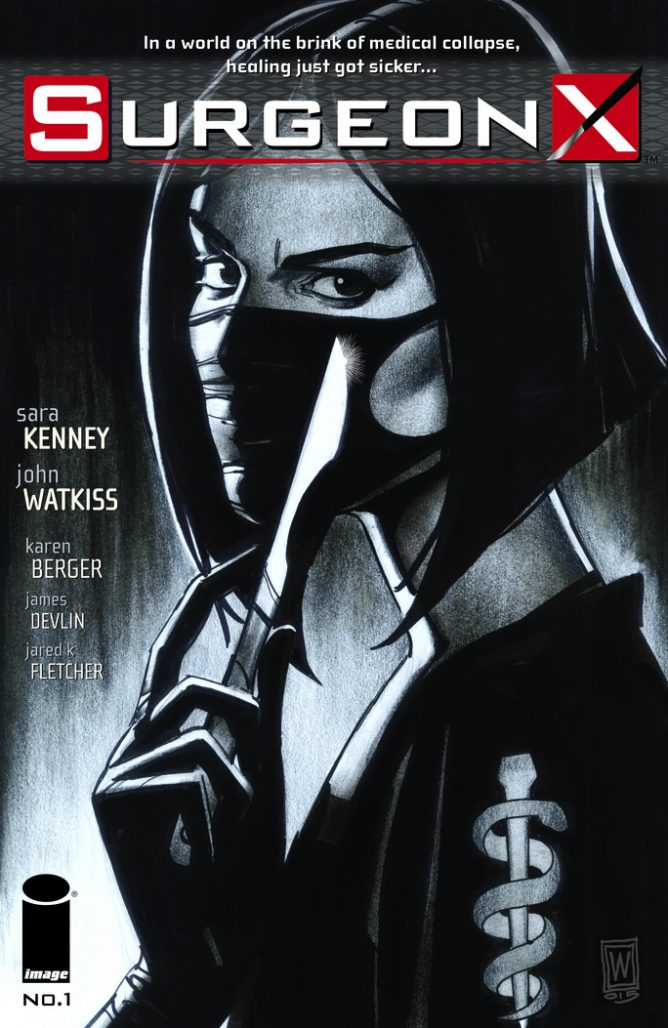
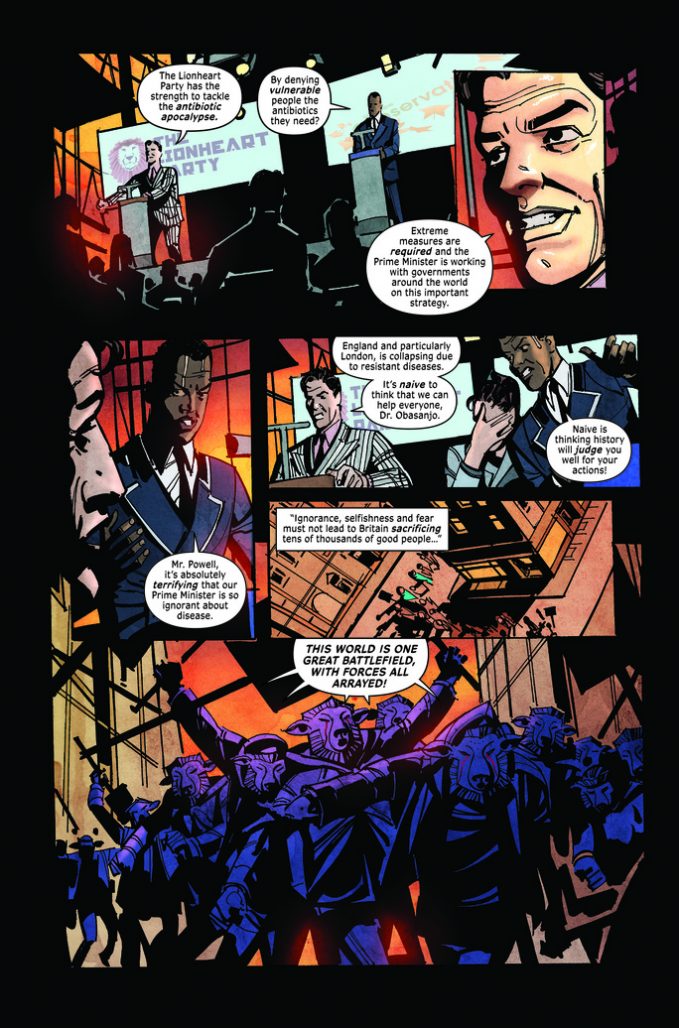

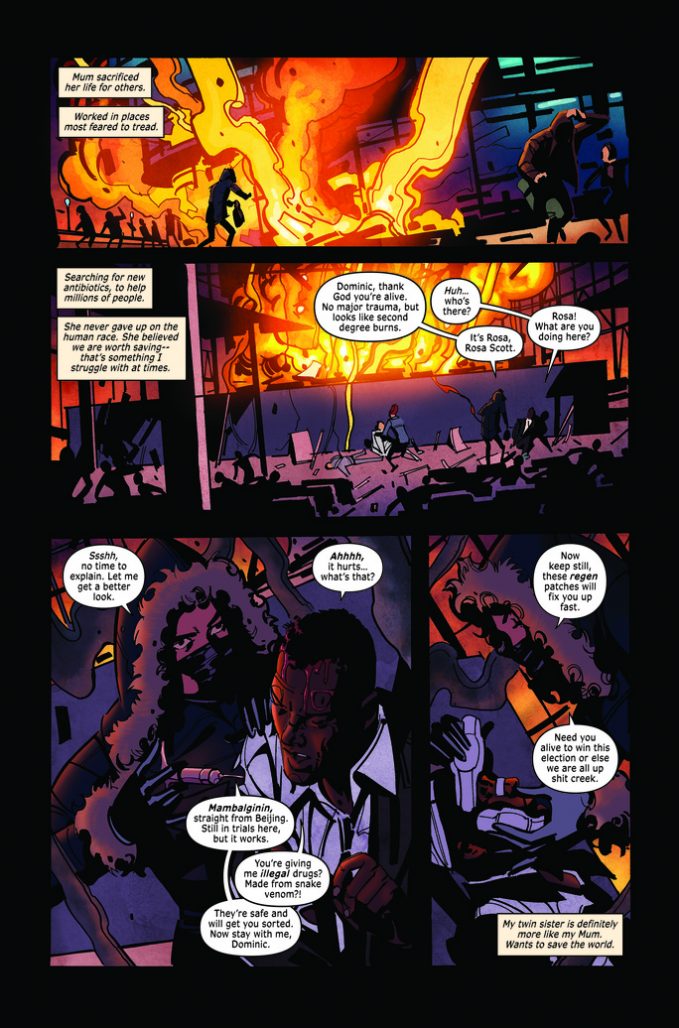
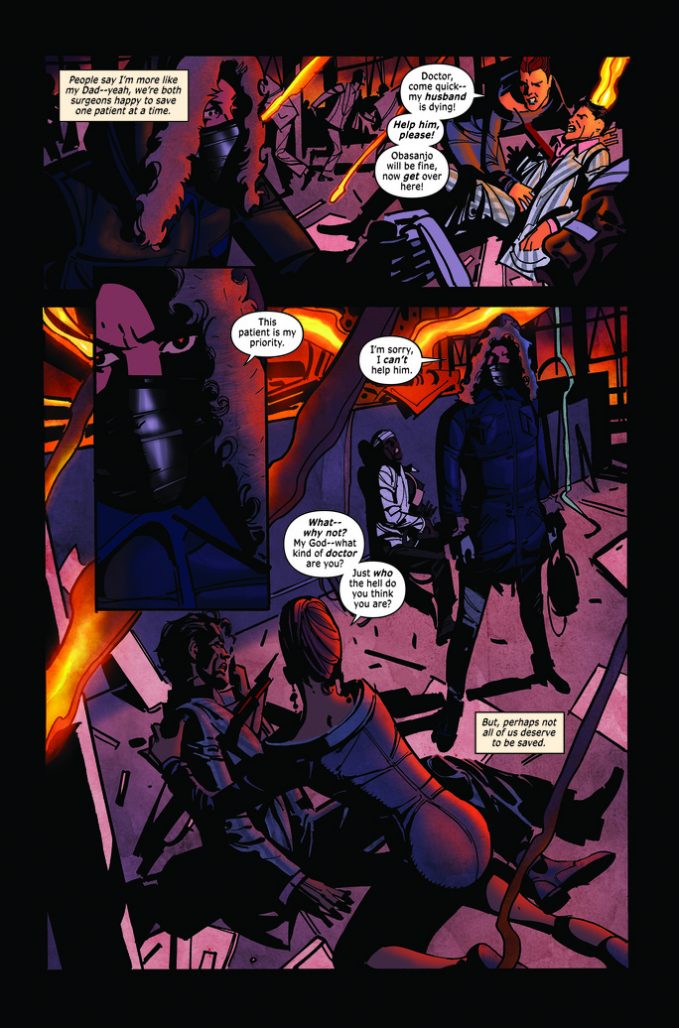
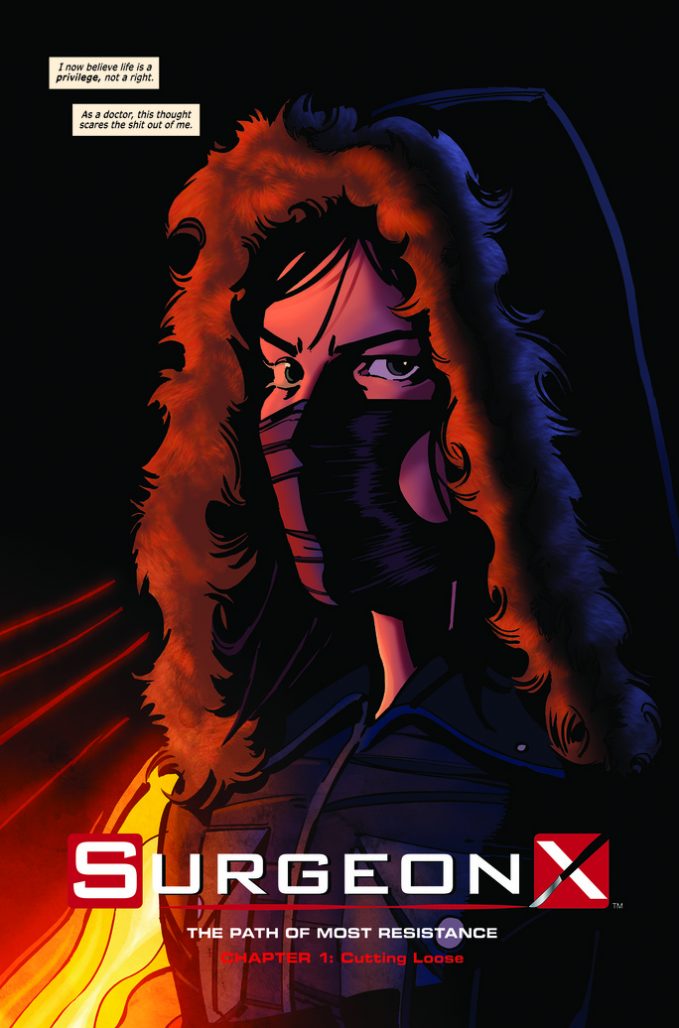
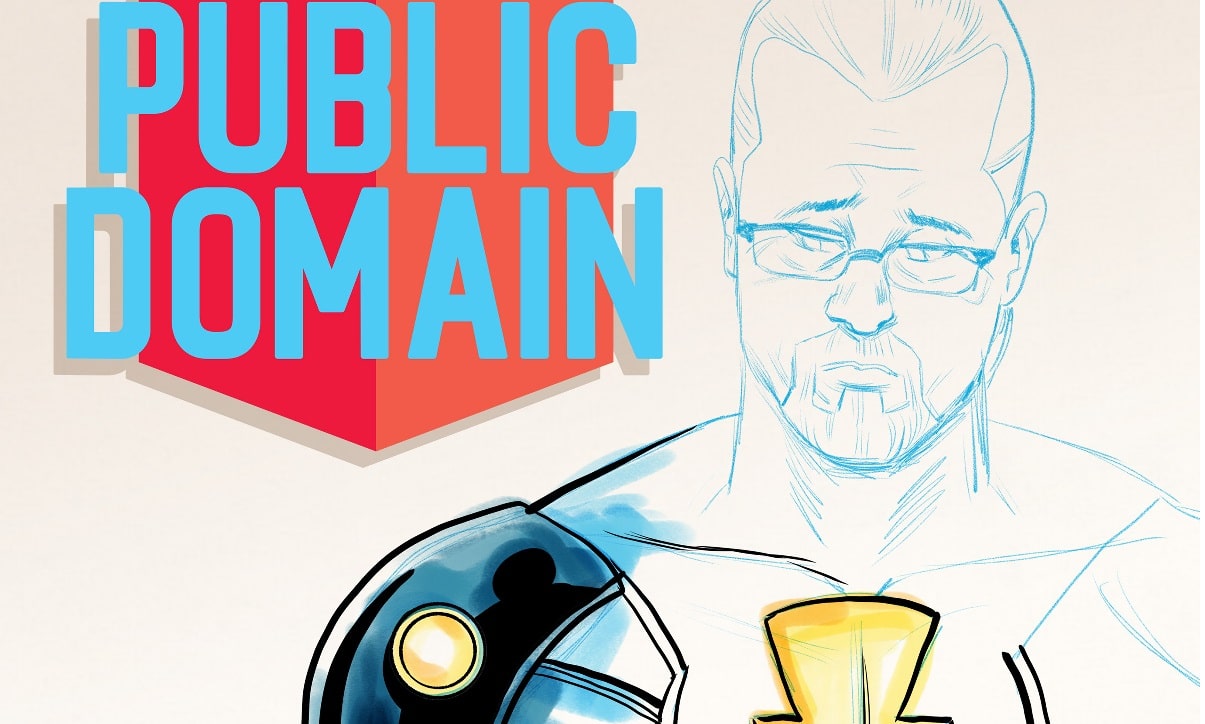




If you have only five pages of previews, wasting half on splashes isn’t helpful.
– “There is nothing to fairly compare this to in the world of comics.”
Tezuka’s BLACKJACK meets GIVE ME LIBERTY and TRANSMET by way of MISTER X?
Comments are closed.